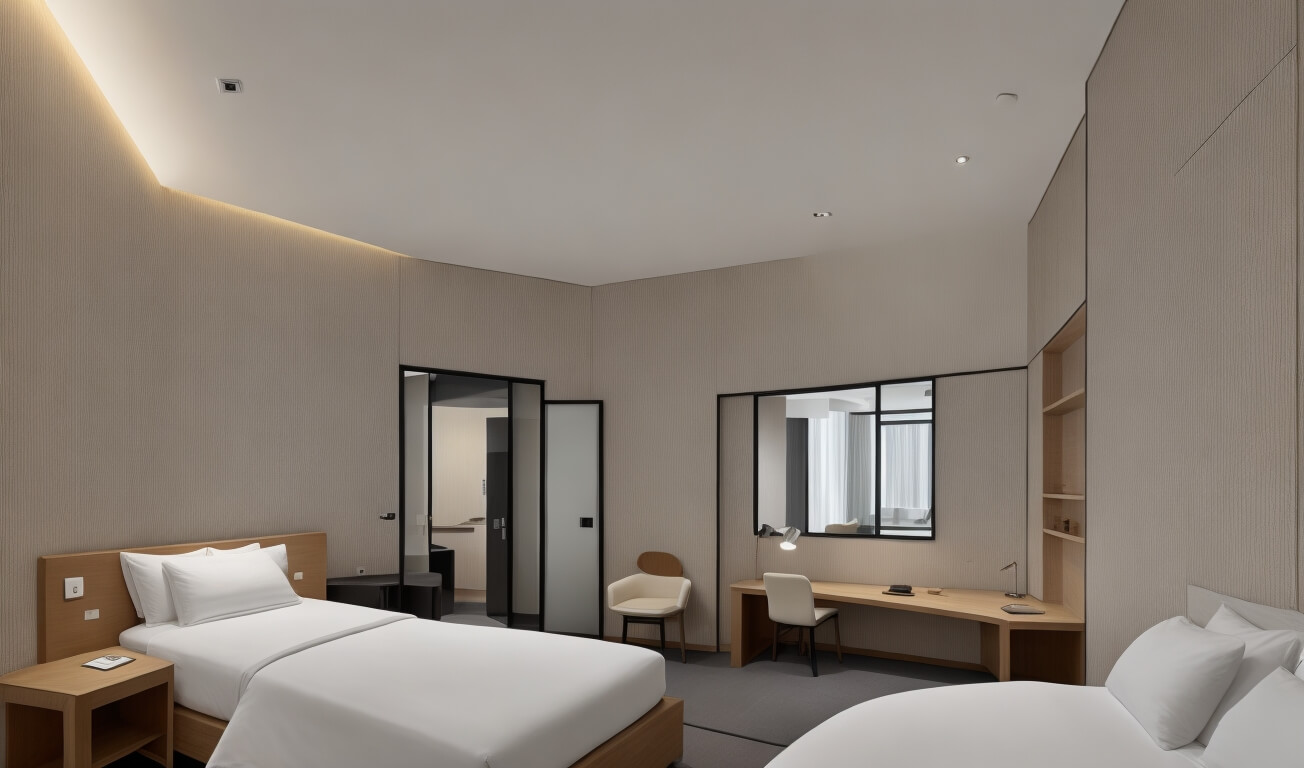
The principles of minimalism, deeply rooted in Zen philosophy, have inspired hoteliers to create spaces that evoke clarity and calmness. With the rise of stress in our daily lives, travelers are increasingly seeking refuge in minimalist environments that promote relaxation and mental wellbeing.
In the bustling modern world, where life often moves at breakneck speed, travel can be as much about seeking sanctuary as it is about adventure. For weary travelers and seekers of serenity, minimalist hotel rooms have emerged as the coveted retreats where the Zen-inspired design plays the gentle host. The beauty of minimalist interiors is in their ability to evoke peace and clarity – forming the perfect tapestry for relaxation. In finding luxury in less, these havens strip away the non-essential, allowing guests to bask in the quintessence of simplicity and tranquility.
Derived from the Japanese word ‘Zen’, which means meditation, Zen-inspired design pulls at the threads of mindfulness, creating spaces where the mind is encouraged to let go of the chaos and relax in the moment. This design philosophy is mirrored in minimalist luxury accommodations that prioritize space over stuff, form over excess, and harmony over disarray. With Zen at its core, the blueprint for these rooms revolves around balance, rhythm, and order.
The Alchemy of Space and Light – Crafting Calmness
The true magic of minimalist hotel rooms lies in the alchemy of space and light; each corner, surface, and beam is curated to fashion a feeling rather than just fill a room. It’s about designing with intention – where every piece of furniture is both functional and artistically deliberate, where negative space is as important as the décor, and where the lighting is meticulously tuned to warm and soothe. In Zen-inspired design, light plays the role of a silent storyteller, waxing the narrative of dawn to dusk with subdued luminance. Artificial light is often subtle, promoting a relaxation-ready atmosphere.
Simplicity in Hotel Interiors – The Art of Essentialism
Curating simplicity in hotel interiors is an art that calls for discernment and discipline. This artistry lies in understanding that less is truly more. Minimalist luxury accommodations celebrate the beauty of essentialism, emphasizing the pieces that have a purpose or spark joy. It’s about choosing quality over quantity, and in doing so, ensuring that each element from the plush bed to the sleek, understated desk speaks of comfort and calm without shouting for attention.
Minimalist hotel rooms often incorporate natural elements, a nod to the principle that human wellness is closely tied to our connection with nature. Zen-inspired design takes this bond seriously, harmonizing interiors with touches of organic materials such as wood, stone, or even flowing water, which all work together to create a serene and grounded ambiance. The element of earthiness helps to bring balance and reinforce the relationship between the indoors and the world outside.
Color and Textures
A minimalist approach to color emphasizes neutral, earthy tones that pay homage to the natural world. In these Zen-inspired sanctuaries, color is applied like a delicate brushstroke – often in soft greys, warm whites, or muted beiges – that beckon the eye with their understated elegance. Splashes of color, when used, are thoughtful and gentle, designed to enhance the feeling of repose.
In luxury minimalist accommodations, texture plays a subtle but pivotal role. Thick, cozy rugs underfoot, smooth stone surfaces, crisp linens, or the soft give of a lush armchair – each detail is a tactile encounter that contributes to the overall experience of quiet indulgence. These textural elements tie into the room’s aesthetics while also providing sensory experiences that ground guests in their surroundings.
Streamlined Furniture – Elegance in Efficiency
Within this paradigm, furnishings play a leading role, by embodying the principle of functional elegance. Minimalist hotel rooms will often feature sleek, contemporary furniture that blends effortlessly into the overall design ethos. It’s about finding pieces that serve their purpose with grace, that are both chic and utilitarian, and that do not obscure the room’s spacious allure.
Uncluttered by Design – A Clear Mind Manifested
Less clutter translates to less distraction and more clarity of mind. This concept is alive and well in the approach to minimalist interiors, where space is curated meticulously to ensure there is a place for everything, and everything is in its place. The uncluttered space is a mental one, inviting guests to unwind and unfurl the wrinkles from their minds.
Modern travelers often desire connectivity and convenience at their fingertips, but in a minimalist room, you won’t find tangled cords or unsightly gadgets. Instead, technology is woven into the design in a way that is almost imperceptible. Think hidden panels, integrated charging stations, and smart systems that respond to the touch of a button, offering the latest in hospitality tech without the visual noise.
Minimalist luxury is not just about the look and feel but also the experience. From the moment you step into a minimalist hotel room, the design subtly works to serve your needs, letting you choreograph your stay. The open floor plans and multipurpose furniture cater to your personal use of space, whether you’re there to relax, work, or meditate.
Concluding Thoughts – A Return to Serenity
The move towards minimalist hotel rooms is a breath of fresh air for travelers who seek solace amidst their journeys. Through the principles of Zen-inspired design, these spaces foster a bond between simplicity, luxury, and well-being, creating sanctuaries that do more than just house guests – they rejuvenate them. As one settles into the embrace of minimalist interiors, with their clean lines and uncluttered ethos, the appreciation for tranquility is renewed. In the harmony of these rooms, the weary find rest, the seekers find clarity, and the lovers of beauty find a lasting impression that travels well beyond their stay.
















